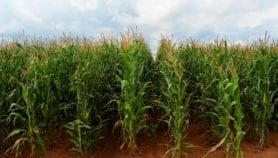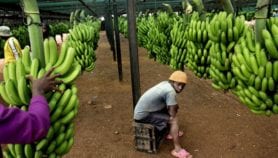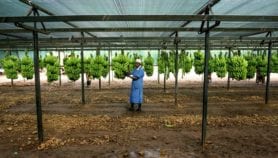By: Margaret Karembu
Send to a friend
The details you provide on this page will not be used to send unsolicited email, and will not be sold to a 3rd party. See privacy policy.
New evidence shows that arguments against GM crops are unfounded, says Margaret Karembu.
The year 2013 marked the 18th consecutive year of commercial cultivation of genetically modified organisms (GMOs) or now commonly referred to as biotech crops.
And in just under two decades, the volume of land on which biotech crops are grown has increased from 1.7 million hectares in 1996 — the first year of commercial planting — to about 175 million hectares in 2013, according to a global report on GM crops released by the International Service for the Acquisition of Agri-biotech Applications (ISAAA) in 2014. [1]
In 2013, more than 18 million farmers in 27 countries across the world made independent choices to grow biotech crops. [1]
Yet, despite these figures showing a technology on the upward trajectory in terms of adoption, the anti-GMO lobby has continued to hold its position that farmers shouldn’t grow biotech crops due to a myriad of excuses. It is important to note such excuses are perpetuated through the most advanced and efficient use of information and communication technologies.
“Contrary to widely held opinion that GM technology will only benefit multi-nationals and is meant for large-scale farmers, the latest trends reveal otherwise.”
Margaret Karembu
How then can this contradiction be explained? Is it okay for one segment of society to access the best technology available for their communication (or is it mis-communication?) but unacceptable to avail similar opportunities and choices to farmers to make farming more efficient? Could such a large number of farmers be fooled for nearly two decades with a technology that is not delivering? Would the governments of these countries growing or approving use of biotech crops be so indifferent and reckless as to allow and support application of the technology in their territories?
Differentiating perception from reality
The first problem with the whole debate against biotech crops is differentiating between perception and reality. A German philosopher, Friedrich Nietzsche once said: “The most perfidious way of harming a cause consists of defending it deliberately with faulty arguments”. While I don’t subscribe to Nietzsche’s philosophical theories, this one statement could hold true in this context. Contrary to widely held opinion that GM technology will only benefit multi-nationals and is meant for large-scale farmers, the latest trends reveal otherwise.
At least 90 per cent of the 18 million farmers who grew biotech crops in 2013 were small-scale resource-poor farmers in developing countries. One of the findings in the ISAAA report, for instance, shows that national benefits to Bt cotton farmers in Burkina Faso were estimated at US$26 million, representing 67 per cent of total benefits with only US$12 million accruing to the technology developers.
Other documented benefits of biotech crops go beyond agricultural improvement to climate change mitigation and environmental sustainability. GM technology has demonstrated the power to provide a better environment and breed crops resilient to harsh climatic conditions such as drought.
For instance, in 2012 biotech crops alone contributed to a reduction of carbon dioxide (CO2) emissions by 26.7 billion kilograms, which is equivalent to taking 11.8 million cars off the road for one year. [2] By reducing the amount of chemical sprays by more than half for a crop such as biotech cotton, GM technology is probably the only agricultural technology that can boast of making this kind of contribution to environmental conservation.
Hidden agenda of activists
The second problem is overcoming vested interest. A look into the source of funding for anti-GM activities reveals that although they are often portrayed as grassroots movements, many are part of a much larger coalition of social activists, environmental NGOs and social-investment organisations backed by a reservoir of funding from special interest foundations.
Almost all anti-GM activists back, and in turn receive support from, organic or so called ‘socially responsible’ investment industries. Competition from cheaper and safer biotech products is seen as a threat, thus the use of anti-biotechnology rhetoric and support for activist groups to validate their products and grow their markets.
The third problem is a strong desire by some interest groups to romanticise poverty and hunger. Ironically, poverty and food insecurity provide booming businesses and a form of ‘tourism’ for several anti-GM lobbyists who know nothing about farming, especially in Africa. While lobbyists spend three quarters of their time globe-trotting and peddling unsubstantiated claims against biotech foods, farmers — especially women — are breaking their backs weeding with their hands and scouting for pests in a merciless scorching sun.
Blocking novel technologies may mean an end to dependency on others for food and diminishing control and access to the continent’s natural resources and ‘free tourism’ disguised in numerous ‘monitoring and farming inspection’ trips. Continuing to deny farmers the choice of proven, safe and efficient agri-biotechnologies would be equated to ‘protecting poverty’ and obstructing them from optimising chances of enhancing their social welfare as well.
Proven to be safe
According to the WHO, the GM foods currently available on the international market have passed safety assessments and are not likely to present health or environmental risks. In addition, no negative effects on human health have been shown as a result of consuming foods by the general population in the countries where they have been approved.
Extensive and independently reviewed health studies — including long-term animal studies — conducted over the past 20 years using the same biotech crops have found no negative results and confirm the safety of biotech foods.
“Blocking novel technologies may mean an end to dependency on others for food and diminishing control and access to the continent’s natural resources and ‘free tourism’ disguised in numerous ‘monitoring and farming inspection’ trips, and, with the most efficient jet.”
Magaret Karembu
The few researchers who have made claims on negative effects refuse to share their data and research protocols for review with regulators or independent academic authorities. When they have shared the data, food safety, health and regulatory agencies have rejected the findings as flawed and misleading. For example, a study published in 2012 that indicated negative safety effects of GM maize was found to have questionable study design. [3] It was retracted last year. [4]
Impacts of GM crops
A study by the African Development Bank and the International Food Policy Research Institute in 2012 concluded that under ideal conditions, the use of GM crops grown by smallholder farmers could improve gross margins by 114 per cent, reduce pesticide costs by 60 to 90 per cent, and improve yields by 18 to 29 per cent. [5] This could make a significant contribution in lifting farming communities out of abject poverty, subsistence farming and improve their health.
Considering these overwhelming progress and opportunities, regardless of the widely spread fears about GM crops, one thing remains certain: That biotech crops have already demonstrated a crucial contribution in fighting food insecurity and environmental degradation.
Coincidentally, in 2015, as the world leaders will meet to re-assess the success and challenges of meeting the Millennium Development Goals, biotech crops will also be marking 20 years of sustained commercial cultivation.
Genetically modified crops will have just turned 20 and in a humanly way, can therefore be considered as young adults, ready to help the global community address these three nagging challenges of poverty, hunger and environmental sustainability.
Margaret Karembu is the director of ISAAA AfriCenter and is also the chair of the Open Forum on Agricultural Biotechnology (OFAB) Kenya Chapter Programming Committee. She has vast experience in managing, implementing and coordinating technology transfer projects as well as diffusion studies on modern biotechnology. She is a science communication specialist, and holds a PhD degree in environmental science education from Kenyatta University, Kenya. She can be contacted at [email protected].
This article has been produced by SciDev.Net's Sub-Saharan Africa desk.
References
[1] James, C. Global Status of Commercialized Biotech/GM Crops: 2013 (ISAAA, 2014)
[2] Brookes G. and Barfoot P. GM crops: Global Socio-economic and Environmental Impacts 1996-2012. (PG Economics Ltd, 2013)
[3] Open Forum on Agriculture Biotechnology in Africa, Kenya chapter. Deficiencies in study linking GM maize to cancer: Global scientific perspectives. (ISAAA AfriCenter, 2013)
[4] Hayes, A. W. “Long term toxicity of a Roundup herbicide and a Roundup-tolerant genetically modified maize” by Gilles Eric Séralini et al. has been retracted by the journal Food and Chemical Toxicology. (Elsevier, 2013)
[5] African Development Bank and International Food Policy Research Institute. AfDB-IFPRI stakeholder consultation meeting on agriculture biotechnology in Africa: Assessment of agriculture biotechnology for Africa. (AfDB and IFPRI, 2012)














